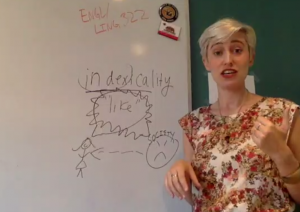In my decade working and learning in higher education, I have held positions at Appalachian State University, University of Arizona, Pima Community College, and CUNY Queens College. I typically teach introductory courses in Cultural and Linguistic Anthropology and Linguistics, as well as higher-division classes on sociolinguistics and language and gender. I frequently teach online classes, and I’ve developed several methods for replicating the engaging, conversational atmosphere of an in-person class. When I do teach in a classroom, I focus on facilitating group discussion and incorporating experiential learning activities (like field trips and original research projects) whenever possible.

At Appalachian State University:
- Understanding Culture (ANT 1415): An introduction to anthropological approaches to the diversity of human cultures.
- Gender, Race, and Class (ANT 2420): An anthropological approach to issues of gender, racial, and class stratification in the U.S. and in other countries.
- Latin America Through Ethnography (ANT 2800): An overview of ethnographic research in and about Latin America.
- Language in Media and Political Discourse (ANT 3500-Independent Study): Advanced readings in language ideology and critical discourse analysis as applied to the study of news media and political discourse.
- Explorations of Latinx Materiality (ANT 3500-Independent Study): Advanced readings in cultural and linguistic anthropology on Latinidad, materiality, media, and popular culture.
- Linguistic Anthropology (ANT 3530): An upper-level introduction to the intellectual history of linguistic anthropology, key theoretical concepts in the subdiscipline, and data collection/analysis techniques.
- Discourse Analysis (ANT 3531): An overview of different theoretical and methodological approaches to the analysis of discourse, including pragmatics, Conversation Analysis, interactional sociolinguistics, and Critical Discourse Analysis.
- Language, Time, and Space (ANT 4533): An advanced undergraduate seminar exploring linguistic anthropological theorizing surrounding time and space.
- Language, Media, and Pop Culture (ANT 4533): An upper-level seminar-style class using linguistic anthropological tools to investigate mass media and popular culture topics.
- Honors Thesis Advising: Emma Strange, “Moral Storytelling Surrounding Voting in Watauga County” (Honors College, Spring 2021); Maria McDowell, “Latinx Identity and Multiethnic Erasure in the Digital World” (Anthropology, Spring 2021); Rachel Anderson (Anthropology, Fall 2021)
At the University of Arizona:
- Culture and the Individual (ANTH 310): An introduction to anthropological approaches to social theory for Anthropology and Sociology majors. (Online)
- Race, Ethnicity, and the American Dream (ANTH 150A1): An introduction to basic issues in cultural and linguistic anthropology through a study of race and ethnicity in the United States. The topics of race and ethnicity are discussed within a broad range of personal and institutional contexts, and common intellectual and personal assumptions about race are closely examined in order to arrive at a deeper understanding of American society and our place within it. (In-Person)
- Many Ways of Being Human (ANTH 150B1): An introduction to basic issues in cultural anthropology. Students investigate several themes that reflect some of the major concerns of anthropology in the past hundred years — kinship, social and economic class, gender, religion, ritual, language, style, and knowledge systems — while exploring the ways in which these traditional concerns have been challenged and rethought by contemporary
anthropologists. These topics are anchored in a reading and discussion of one or more ethnographies. (In-Person and Hybrid/Online) - Language (LING 150A1): Explores the central questions about the nature of human beings, focusing on individual experience. This course focuses on language, providing a survey of linguistic concepts and methods: communication among animals, physiology of human speech, elementary phonetics, syntax, language and thought, language change, language and the brain. (Online and In-Person)
- Introduction to Linguistics (LING/PSY 201): Designed for individuals entering the field of linguistics or for those in related disciplines (psychology, philosophy, speech and hearing sciences, etc.) or those that are merely curious. Surveys key concepts in phonetics, phonology, morphology, syntax, semantics, pragmatics, and sociolinguistics. (In-Person)
- The Nature of Language (ANTH 276): Focuses on introducing students to central questions in linguistic anthropology, such as: What is the role of “language” in human cultures and societies across the world? How does the relationship between language, culture, and society work? Includes many different aspects of the language-culture-society relationship, such as the structure of language and cognition; the acquisition of the formal and social rules of language; dialects, accents, and ways of speaking a language that vary across social and geographic space; the role of language in the construction of identities and the perpetuation of discriminatory discourses; and other topics. (Online)
- Language and Gender (ANTH 303): Introduces general theories and approaches to the study of language and gender through a broad range of interdisciplinary literature on language and gender, and language and sexuality. (Online)
- Varieties of English (ANTH 383): Introduces students with no previous background to sociolinguistics through the lens of English variation. Various sociolinguistic theories are used to understand dialectal variation, as well as stereotypes and ideologies. (Online)
- Language and Social Issues (COMM/LING 320): Focuses on the relationship between linguistic variation within and across languages, and social issues; on understanding the effect that linguistic variation has on individuals and groups in everyday life, in a range of settings; on understanding the major themes in sociolinguistic and linguistic anthropological theory; preparing students to engage with scholarly work in sociolinguistics and linguistic anthropology; and preparing students to be able to observe and accurately describe linguistic phenomena in everyday life. (Online and in-person)
- Structure and Meaning of Words (ENGL/LING 322): Covers the formal properties (phonology and morphology), meaning (lexical semantics) and history (etymology) of English words, as well as how words are learned (acquisition). (Online)
At Pima Community College:
- The Nature of Language (ANT 215): Introduction to anthropological linguistics. Includes the history of linguistics, descriptive linguistics, sociolinguistics, language and culture, and language and biology. Also includes language acquisition, language and education, and the history of language and writing. (In-Person)
At CUNY QUEENS college:
- Language, Culture, and Society (ANTH 104): Introduction to linguistic anthropology, its theoretical and methodological issues, and central topics of research. Includes language in its sociocultural context, the role of individual language users and social groups in sociolinguistic and linguistic change, and how linguists and anthropologists engage real world issues. Also addresses commonly held misconceptions about language and explore important issues related to linguistic diversity and the politics of language across cultures. (In-Person)
